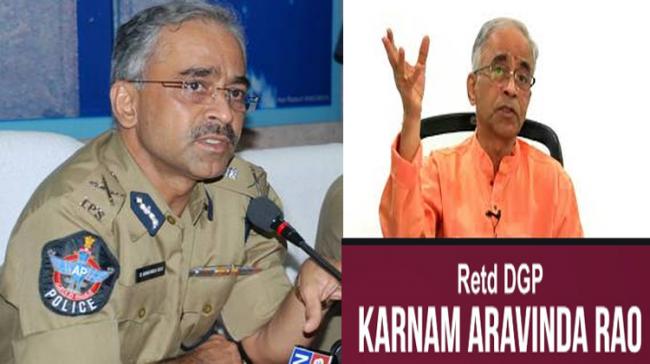From Khaki To Spiritualism, Meet AP’s Former Top Cop Now Devoted To Sanskrit

Mohammed Shafeeq
Hyderabad: After their retirement, the Indian Police Service (IPS) officers usually take up jobs in private companies or comfortably enjoy their post-retirement life but here is a former police chief of the erstwhile combined Andhra Pradesh who has taken a very different approach.
Karanam Aravinda Rao, who served as Director General of Police (DGP) in undivided Andhra Pradesh during 2010-11, is not only promoting Sanskrit but has taken to spirituality through this ancient language. Aravinda Rao, who holds a Ph.D. in Sanskrit, today delivers discourses and writes books to explain the teachings of Hindu religious scriptures to many in India and abroad.
"His discourses on various topics like Srimad Bhagavad Gita, the Upanishads, and Advaita Vedanta weave ancient wisdom with practical knowledge," says Advaita Academy of which he is a trustee.
From 'khaki' to spiritualism, it has been a total transformation for the 1977 batch IPS officer, who was considered an expert in dealing with the Maoists. "It was pure interest," he said when asked what motivated him to learn and promote Sanskrit. "After retirement you have to do something. I didn't want to take up any job. I just wanted to read, write and teach. That's what I am doing."
Why Sanskrit? "Because that's the language in which all our basic texts are there. The idea is to know what is there in the texts and to tell our people," said Rao, who was conferred the honorary title of Vachaspati by Rashtriya Samskrit Vidya Peetham, a deemed university, for his valuable services in the field of Sanskrit studies.
He penned many books in English, Telugu and Sanskrit to tell people what is there in the sacred texts. 'A Guide to Bhagavad Gita', 'How to tell Hinduism to your child', 'Motivational verses from Sanskrit texts', 'Isavasya Upanishad', 'Analysis of Jnanam in the Upanishads' and 'Bhajagovindam' are some of the books he wrote.
In fact, writing is not new to Rao. While heading the Greyhounds, a special anti-Maoist wing of the police, he wrote a book 'Naxalite Terrorism: Social and Legal Issues'. Rao was one of the top officials who played key role in the successful multi-pronged strategy of Andhra Pradesh in effectively dealing with the Left wing extremism.
Seen as an authority to counter Left wing extremism, he served as Deputy Inspector of General (DIG) of Greyhounds and headed the state intelligence for a long time.
He served as the superintendent of police in five districts in Telangana and Andhra regions of then undivided state. These include districts worst affected by Maoist activity, which was then at its peak. With a thorough understanding of Maoist ideology, he even tried to wean away Maoists from their futile and destructive path.
Known for his clean track record and simplicity, Rao also held the key posts like police commissioner of Vijayawada, additional commissioner of police of Hyderabad, additional director general of state intelligence department, inspector general of police, Crime Investigation Department (CID) and director general of Anti-Corruption Bureau (ACB).
Hailing from lower middle class family in a remote village Karanam in Anantapur, Rao's ambition was to become a professor but he became a police officer. In one of his interviews after retirement, Rao revealed that he started studying Sanskrit in 1994 to understand 'Upanishads'. With some introduction to Sanskrit in childhood, he started studying the ancient language from a professor. He did MA and subsequently Ph.D. in Sanskrit.
An avid book reader, he used his knowledge of Sanskrit to go through Bhagavad Gita, Upanishads and Brahmasutras. He started concentrating on developing Sanskrit scholars and researching Hindu 'Siddhanta' and strengthening it. He focuses on Upanishads and the commentaries written by Sankaracharya and his disciples. The former IPS officer said all this gave him mental peace and happiness.
Today, he feels satisfied when he receives letters from abroad written by those who watched his discourses online. He is associated with an organisation working for promoting Sanskrit and Telugu languages, and is happy to be a part of the effort to preserve the culture and language. (IANS)
Also Read: Long Weekend? Here Are Some Trek Hotspots You Could Head To In South India





